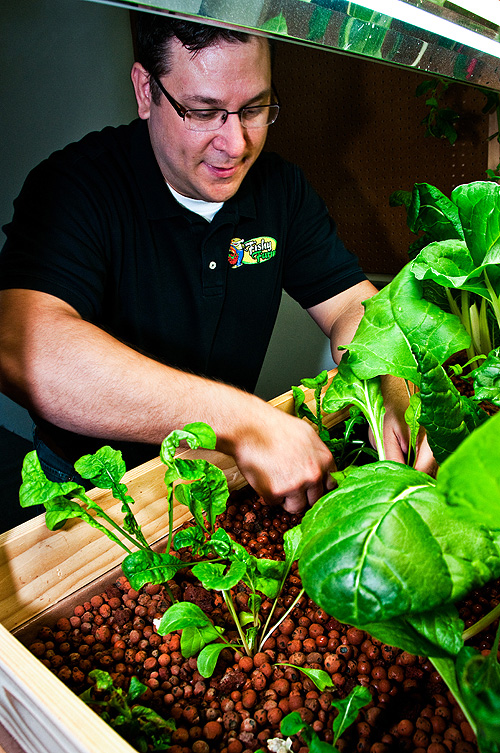 Jon Thenhaus’s latest business idea grew out of a simple desire to have an infinite supply of fresh basil within easy reach in the kitchen. That wish grew more complicated as he refined his ideas and followed his muse, from herbs to worms and fish. Nine prototypes and several “massive failures” later, the 37-year-old founder of Fishy Farm has developed an ingenious ecosystem for the kitchen or the back yard.
Jon Thenhaus’s latest business idea grew out of a simple desire to have an infinite supply of fresh basil within easy reach in the kitchen. That wish grew more complicated as he refined his ideas and followed his muse, from herbs to worms and fish. Nine prototypes and several “massive failures” later, the 37-year-old founder of Fishy Farm has developed an ingenious ecosystem for the kitchen or the back yard.
Jon Thenhaus’s latest business idea grew out of a simple desire to have an infinite supply of fresh basil within easy reach in the kitchen. That wish grew more complicated as he refined his ideas and followed his muse, from herbs to worms and fish. Nine prototypes and several “massive failures” later, the 37-year-old founder of Fishy Farm has developed an ingenious ecosystem for the kitchen or the back yard.
The Fishy Farm consists of a fish tank underneath an herb garden. The indoor model is tight and compact, while the outdoor model has a much larger tank and a tight seal to keep the fish safe from marauding critters.
It works like this: human feeds fish, fish feed worms, worms feed plants, and plants (and occasionally fish) feed humans. Water pumps up from the fish tank to the herb garden, where worms convert fish poop into fertilizer. The water filters down through volcanic pumice and pebbles of clay, back to the fish tank. Thenhaus, who describes himself as “really, really lazy,” insists that no work is required to keep the water clean. Apparently the worms and plants do the work.
 |
Jon Thenhaus, founder, Fishy FarmPhoto by Teresa Meier |
I don’t know about lazy, but Thenhaus definitely struck me as sharp and inventive when I visited him at his small storefront recently. Fishy Farms is Thenhaus’s second Hillsboro-based startup. His first, Oregon Environmental Systems, employs a dozen people selling solvent recyclers globally. A native of Spencer, Neb. (population 530 when he was a kid), he settled in Oregon after growing tired of flying four days a week for his previous jobs setting up communication systems for global companies.
Thenhaus has sold just “a handful” of Fishy Farms (prices start at $999), but he has ambitious plans to incorporate his designs into greenhouses, kitchen remodels and restaurants. He’s been talking to Oregon Tilth about how to earn an organic designation and researching opportunities for franchising the brand.
The basil is now within easy reach. Thenhaus’s herb garden in his kitchen puts the finishing touch on dinner, while the farm in his back yard is larger and more ambitious, the tank stocked with koi and rainbow trout. He says the fish survived just fine during a recent freeze, as did the plants. “I didn’t have to do anything,” he says. “The ice melted and they went right back to growing.”
He’s hoping the same trend will apply to his business.

